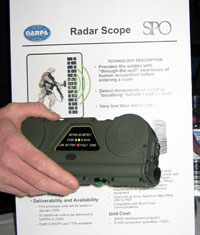Entered into the database on Thursday, January 05th, 2006 @ 18:47:50 MST
New Device Will Sense Through Concrete Walls American
Forces Press Service | January 3, 2006 Troops conducting urban operations soon will have the capabilities of superheroes,
being able to sense through 12 inches of concrete to determine if someone is inside
a building. The new "Radar Scope" will give warfighters searching a building
the ability to tell within seconds if someone is in the next room, Edward Baranoski
from the Defense Advanced Research Projects Agency's Special Projects Office,
told the American Forces Press Service. By simply holding the portable, handheld device up to a wall, users will be
able to detect movements as small as breathing, he said. The Radar Scope, developed by DARPA, is expected to be fielded to troops in
Iraq as soon as this spring, Baranoski said. The device is likely to be fielded
to the squad level, for use by troops going door to door in search of terrorists. The Radar Scope will give warfighters the capability to sense through a foot of
concrete and 50 feet beyond that into a room, Baranoski explained. It will bring to the fight what larger, commercially available motion detectors
couldn't, he said. Weighing just a pound and a half, the Radar Scope will be
about the size of a telephone handset and cost just about $1,000, making it
light enough for a soldier to carry and inexpensive enough to be fielded widely. The Radar Scope will be waterproof and rugged, and will run on AA batteries,
he said. "It may not change how four-man stacks go into a room (during clearing
operations)," Baranoski said. "But as they go into a building, it
can help them prioritize what rooms they go into. It will give them an extra
degree of knowledge so they know if someone is inside." Even as the organization hurries to get the devices to combat forces, DARPA
already is laying groundwork for bigger plans that build on this technology. Proposals are expected this week for the new "Visi Building" technology
that's more than a motion detector. It will actually "see" through
multiple walls, penetrating entire buildings to show floor plans, locations
of occupants and placement of materials such as weapons caches, Baranoski said. "It will give (troops) a lot of opportunity to stake out buildings and
really see inside," he said. "It will go a long way in extending their
surveillance capabilities." The device is expected to take several years to develop. Ultimately, servicemembers
will be able to use it simply by driving or flying by the structure under surveillance,
Baranoski said.
